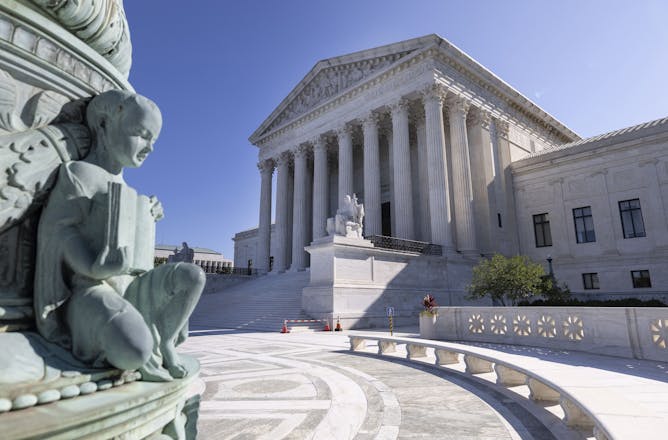|
I am a longtime observer of politics, and it’s clear to me that we’re living in a kind of “conflict-of-the-day” period. That’s when important political – and usually partisan – fights that have erupted nationally or in Washington, D.C. become the subject of relentless journalistic coverage and discussion on social media. Everybody’s an expert, it seems, on what might be a pretty complicated subject.
For a while, the conflict-of-the-day was the filibuster; lots of people were, evidently, experts on legislative procedure, history and norms, and felt little reluctance to opine at length. Ditto for packing the Supreme Court.
I’m not against people having opinions. But as a journalist, I believe it’s always better to have the facts first. Providing those facts means we’ll always have a role to play here at The Conversation, and this past week was no exception. The much-discussed conflict these days is over an upcoming case at the Supreme Court: Will the justices overthrow a 1972 precedent set by the court that established a woman’s constitutionally protected right to an abortion?
The public discussion is all about precedent and whether it’s right or wrong to overturn it, with a lot of heat and not always that much light. So editor Jeff Inglis commissioned a professor of both law and political science, David Schultz, to explore the “central principle of law,” as Schultz puts it, that “Courts are supposed to follow earlier decisions – precedent – to resolve current disputes.” Schultz reminds readers that, while overturning precedent used to
be rare, it has become more common. In one famous case, the Supreme Court overruled its own precedent and declared in Brown v. Board of Education that segregation in schools was
unconstitutional.
|

How much importance does the Supreme Court place on prior decisions?
Kevin Dietsch/Getty Images
David Schultz, Hamline University
There is value in observing legal precedent, but sometimes circumstances, logic or judges’ views determine it’s time to overturn it.
|

Some Americans are looking past Joe Biden, seeking the return of Donald Trump as president.
AP Photo/Julio Cortez
Robert A. Pape, University of Chicago
A representative survey of American adults finds broader support for violent insurrection than many would like to think.
|

Hundreds of people who want to flee the country gathered outside the international airport in Kabul, Afghanistan, Aug. 17, 2021.
AP photo
Shelley Inglis, University of Dayton
The dangerous situation faced by Afghans who want to flee, but can’t, shows how unwilling or unprepared the US and other countries are to deal with refugees.
|
|
|
-
Nolan Fahrenkopf, University at Albany, State University of New York
Despite efforts to prevent militant groups from getting weapons, they often get their hands on U.S. equipment and use it to attack American troops.
-
Filippo Menczer, Indiana University
You have evolved to tap into the wisdom of the crowds. But on social media your cognitive biases can lead you astray, something organized disinformation campaigns count on.
-
Ahmet T. Kuru, San Diego State University
Nahdlatul Ulama is the world’s biggest Islamic organization, initiating a reform movement, which it is calling ‘Humanitarian Islam.’
-
Michael Z. Green, Texas A&M University
CEOs in private industry who have been accused of sexual harassment can cost their companies if they do as New York Gov. Andrew Cuomo did and fight the charges.
-
Robin Lennon-Dearing, University of Memphis
Current HIV criminal laws increase HIV stigma and discrimination against marginalized people – and negatively affect public health.
|
|